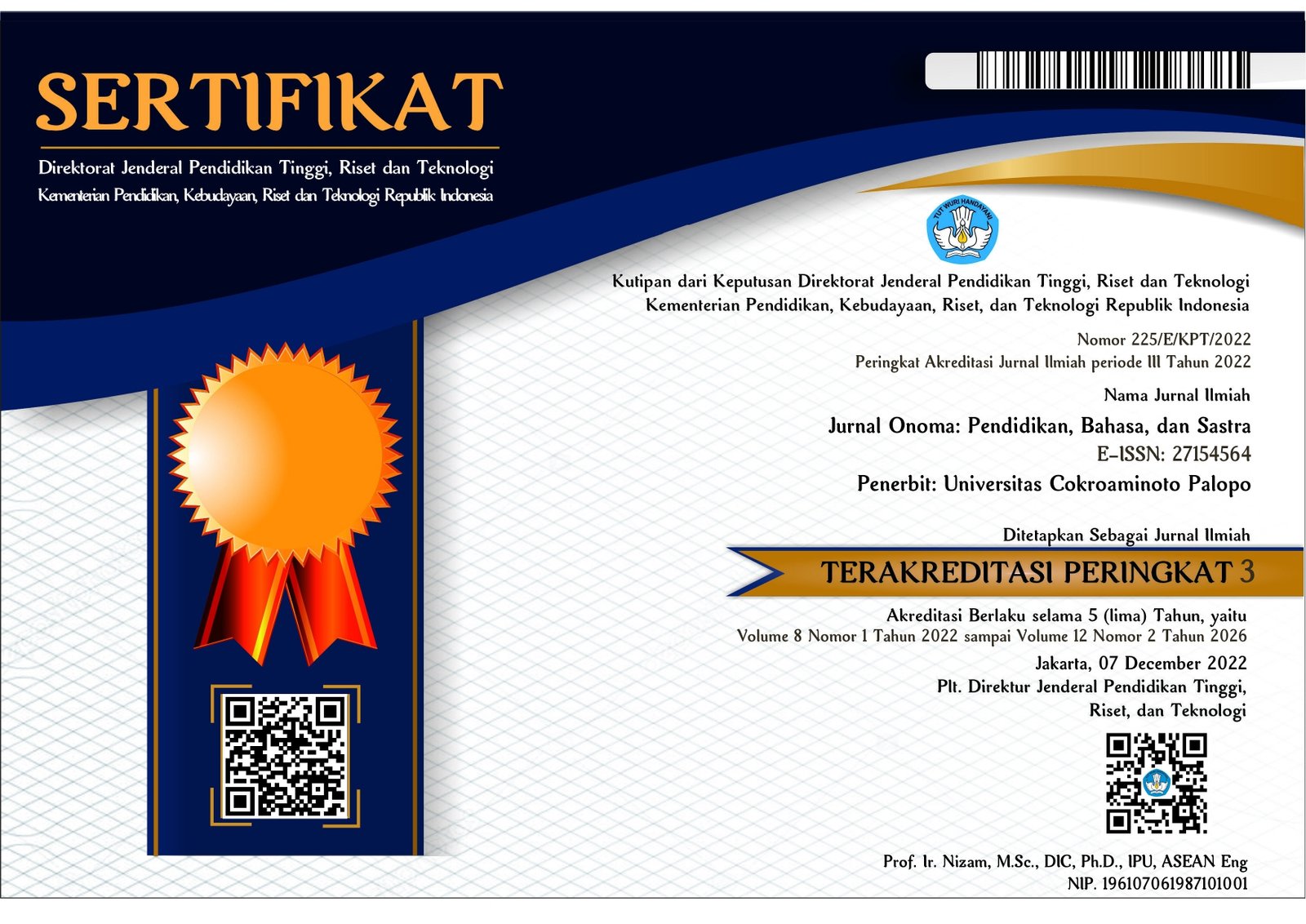Perkembangan Teknologi dan Praktik Kesantunan Berbahasa di Sekolah Dasar
https://doi.org/10.30605/onoma.v10i2.3541
Keywords:
Perkembangan Teknologi, Kesantunan Berbahasa, LeechAbstract
Tujuan artikel ini untuk membahas tentang praktik kesantunan berbahasa di Sekolah Dasar dan kaitannya terhadap perkembangan teknologi seperti media sosial dan platform digital. Menggunakan pendekatan metode kualitatif dengan jenis penelitian menggunakan studi fenomenologi. Penelitian ini hendak menjawab perkembangan teknologi dan praktik kesantunan berbahasa di Sekolah Dasar baik tuturan guru dengan peserta didik serta tuturan antar peserta didik berdasarkan teori kesantunan berbahasa menurut Leech (1993). Hasil dari penelitian ini menunjukkan bahwa peserta didik terkadang menggunakan bahasa yang sedang tren di media sosial yang tuturannya dapat menjadi tuturan yang mematuhi dan melanggar prinsip kesantunan berbahasa menurut Leech (1983) yang meliputi maksim kebijaksanaan, maksim kedermawanan, maksim penghargaan, maksim kerendahan hati, maksim kesetujuan, dan maksim kesimpatisan.
Downloads
References
Abd. Hadi, Asrori, R. (2021). Penelitian Kualitatif Studi Fenomenologi, Case Study, Grounded Theory, Etnografi, Biografi. CV Pena Persada.
Anggarini, P., Manangkot, M., & Kamayani, O. A. (2022). Hubungan kecanduan internet dengan kecerdasan emosional pada remaja. Jurnal Ilmu Keperawatan Jiwa, 5(2), 381–394. https://journal.ppnijateng.org/index.php/jikj
Anna, S., & Suparman, S. (2018). Kemampuan Menulis Karangan Argumentasi Mengunakan Media Wall Chart (Bagan Dinding) Siswa Kelas Vii Smp Negeri 1 Malangke Barat Kabupaten Luwu Utara. Jurnal Onoma: Pendidikan, Bahasa, dan Sastra, 2(2).
Ardiani, M. (2020). Media Sosial, Identitas, Transformasi, dan Tantangannya. Intrans Publishing Group.
Azizi, M. A. (2023). Konsep Technological Determinism Dalam Penelitian Komunikasi dan Pengaruhnya Terhadap Kehidupan Manusia. Universal Grace Journal, 1(1), 34–43. https://ejurnal.ypcb.or.id/index.php/ugc/article/view/1
Chaer, A. (2010). Kesantunan Berbahasa. PT Rineka Cipta.
Danuri, M. (2019). Development and transformation of digital technology. Infokam, XV(II), 116–123.
Jamun, Y. M., & Momang, H. D. (2021). Pengembangan Aplikasi Pembelajaran Kesantunan Berbahasa Anak Usia Dini Berbasis Multimedia. Jurnal Anak Usia DIni Dan Pendidikan Anak UsiaDini, 7(1), 7–20.
Leech. (1983). Principles of Pragmatics. London: Longman.
M.Aminullah, M. A. (2020). Konsep Pengembangan Diri Dalam Menghadapi Perkembangan Teknologi Komunikasi Era 4.0. Komunike, 12(1), 1–23. https://doi.org/10.20414/jurkom.v12i1.2243 DOI: https://doi.org/10.20414/jurkom.v12i1.2243
Mahmudi, A. G., Irawati, L., & Soleh, D. R. (2021). Kesantunan Berbahasa Siswa dalam Berkomunikasi dengan Guru (Kajian Pragmatk). Deiksis, 13(2), 98. https://doi.org/10.30998/deiksis.v13i2.6169 DOI: https://doi.org/10.30998/deiksis.v13i2.6169
Mudiono, A. (2022). Teaching language politeness through social media for the elementary school students. Eurasian Journal of Applied Linguistics, 8(3), 32–44. https://doi.org/10.32601/ejal.803003
Prasanti, D. A. K. (2020). The Influence Of Social Media On The Reduced Politeness Of Language In Adolescents. Bezbednost, Beograd, 62(1), 138–156. https://doi.org/10.5937/bezbednost2001138k DOI: https://doi.org/10.5937/bezbednost2001138K
Prayitno, H. J., Huda, M., Inayah, N., Ermanto, Ardi, H., Giyoto, & Yusof, N. (2021). Politeness of Directive Speech Acts on Social Media Discourse and Its Implications for Strengthening Student Character Education in the Era of Global Education. Asian Journal of University Education, 17(4), 179–200. https://doi.org/10.24191/ajue.v17i4.16205 DOI: https://doi.org/10.24191/ajue.v17i4.16205
Prof. Dr. Sugiyono. (2022). Metode Penelitian Kuantitatif, Kualitatif dan R&D. ALFABETA.
Putri, D., Erningsih, E., & Melia, Y. (2023). Analisis Pengaruh Penggunaan Media Sosial Tiktok Pada Perubahan Perilaku Siswa Sekolah Dasar Di Jorong Pasar Sijunjung Nagari Sijunjung. Puteri Hijau : Jurnal Pendidikan Sejarah, 8(X), 170. https://doi.org/10.24114/ph.v8i2.44995 DOI: https://doi.org/10.24114/ph.v8i2.44995
Rahardi, K. (2005). Pragmatik Kesantunan Imperatif Bahasa Indonesia (I. Syafrida & Y. Sumiharti (eds.)). PENERBIT ERLANGGA.
Rahayu, A. P., Budiman, I. A., & ... (2021). Pendidikan karakter dan kebiasaan berbahasa anak sekolah dasar di media sosial. Seminar Nasional Pendidikan FKIP UNMA, 3(3), 229–232.
Rahayu Widawati Guru Bahasa Indonesia SMA Muhammadiyah, R. (2018). Pengaruh Media Sosial Terhadap Kebiasaan Berbahasa. Seminar Nasional SAGA#2 (Sastra, Pedagogik, Dan Bahasa), 1(1), 405–414.
Suparmin. (2018). Bentuk Santun Berbahasa Di Sekolah Dasar. Edudikara: Jurnal Pendidikan Dan Pembelajaran, 3(4), 331–339. DOI: https://doi.org/10.32585/edudikara.v3i4.21
Wijayana, J. D. P. (1996). Dasar-Dasar Pragmatik. Yogyakarta : Penerbit Andi.
Downloads
Published
How to Cite
License
In submitting the manuscript to the journal, the authors certify that:
- They are authorized by their co-authors to enter into these arrangements.
- The work described has not been formally published before, except in the form of an abstract or as part of a published lecture, review, thesis, or overlay journal.
- That it is not under consideration for publication elsewhere,
- That its publication has been approved by all the author(s) and by the responsible authorities – tacitly or explicitly – of the institutes where the work has been carried out.
- They secure the right to reproduce any material that has already been published or copyrighted elsewhere.
- They agree to the following license and copyright agreement.
License and Copyright Agreement
Authors who publish with Onoma Journal: Education, Languages??, and Literature agree to the following terms:
- Authors retain copyright and grant the journal right of first publication with the work simultaneously licensed under Creative Commons Attribution License (CC BY 4.0) that allows others to share the work with an acknowledgment of the work's authorship and initial publication in this journal.
- Authors are able to enter into separate, additional contractual arrangements for the non-exclusive distribution of the journal's published version of the work (e.g., post it to an institutional repository or publish it in a book), with an acknowledgment of its initial publication in this journal.
- Authors are permitted and encouraged to post their work online (e.g., in institutional repositories or on their website) prior to and during the submission process, as it can lead to productive exchanges, as well as earlier and greater citation of published work.

















